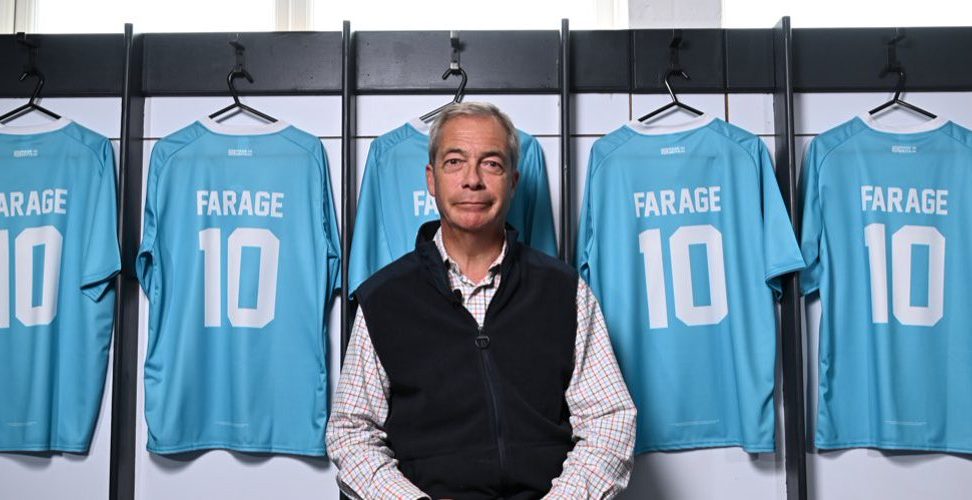Two shirts were in the news at the weekend, both worn by politicians. In the light blue corner, we had Nigel Farage launching his personally branded football strip top – in Reform colours, with the name Farage and the number 10, a bargain at £39.99 (£99.99 if you want it signed by the man himself). In the red corner, meanwhile, Culture Secretary Lisa Nandy attended Wigan Pride – one of the never-ending LGBTQ+ moveable feast days that populate the calendar on either side of the holy Pride month itself – wearing the official t-shirt of the event, emblazoned with a ‘trans rights’ slogan.
Farage’s football top has gone down very well with the people it was intended to go down very well with, selling 5,000 units in its first day on sale. And it put ants in the pantaloons of Reform’s detractors – another intended outcome, one suspects – who spent Sunday on the socials spluttering about how this was the acceptable face of the hard right, etc etc.
Today, silly emblems and slogans and campaigns abound in public life
Some sniff a whiff of burnt horsehair whenever Farage appears. This derangement, strangely, increases whenever he does something naff, like launching personalised schmutter. It’s much the same syndrome as when Boris Johnson’s slapdash demeanour was vaunted, often by the very same detractors, as the lid on a pot of simmering evil. People on the right aren’t allowed the leeway of just being corny or erratic.
The Reform FC shirt provided a tiny morsel of levity, which in these doomy times is much needed. A friend of mine has many of the same misgivings about Reform that I have, but thinks that while we wait we might as well vote for what is, undoubtedly, the campest of the political parties.
You’d think Wigan Pride, festooned with the glitter and bunting that decorate all things LGBTQ+, might be a rival for the camp crown, but – as ever with such events – the sparkle was dimmed by shadows of contention, in this case Nandy’s ‘Protect The Dolls’ t-shirt. This slogan, for those of you who are unaware, is an American rallying cry to extol the ‘rights’ of men who claim to be women to vault over the barriers placed around all other men. The ‘dolls’ in question are those chaps who make a better fist of convincing anybody that they might actually be ladies. (The ones who don’t are known as ‘bricks’.)
So to sum up, this is the Culture Secretary taking a position aligning herself with the extreme fringes of a deeply unpopular campaign that her own administration is now trying, somewhat cackhandedly of course, to back away from.
You may remember how Nandy declared, on being appointed to her cabinet role, that the culture war was now over. Peace in our time! Here she is, a year later, still fighting it, the Neville Chamberlain of 2025. Nandy is a born follower of whatever her milieu considers right and proper on a given day, however bizarre. She has form on this issue, telling an audience back in 2020 that rapists should be accommodated in women’s prisons if they fancy it.
And here she is again, doing and saying what is politically expedient, slipping on the Wigan Pride t-shirt. As Philip Patrick noted here the other day with reference to Nicola Sturgeon, one of the big problems with the trans issue is the enthusiasm for it from party workers and staffers. Added to this, Nandy, as an MP, has to engage with ‘communities’ and ‘stakeholders’ – which means wearing an item of their choosing and posing for photos wearing it.
These are not the parish pump affairs of the old local politics. Political figures of all the main parties have been beclowned at Pride events, from Boris Johnson in a Pink Stetson to Keir Starmer swathed in glitter – which just made him look as if he’d contracted a particularly nasty case of psoriasis.
I can’t imagine someone as toxically agreeable as Nandy handling the awkwardness of the T-shirt situation in any other way but acquiescence. She shouldn’t have had to. There should be a simple rule for politicians on their visits to Prides, mosques, or anywhere else: no merch, no slogans, no cultural frills or campaigning furbelows. This rule would enable the politician, when presented with a hat marked ‘UP THE TALIBAN’ or a badge marked ‘DOWN WITH KITTENS’ to sigh and say ‘so sorry, obviously I’d love to don this tasteful item, but it’s against the rules, I’m afraid; my hands are tied’.
Today, silly emblems and slogans and campaigns abound in public life, and this rule would at least take politicians out of that loop. Another news story at the weekend, for example, informs us that the BBC has purchased 10,000 badges, 7,000 mugs and 6,000 lanyards branded ‘Call It Out’, at a cost of £61,000, in an effort to remind their staff not to harass and abuse each other.
There is something quintessentially perfect about this story – a modern British institution thinking it can solve a serious problem of criminality with branding. The Blairite consensus smashed up our common culture and morality, forged after centuries of trial and error, and now seeks to replace it – with merch.
Politicians should, if they absolutely must, slip into their own silly campaign wear, but they shouldn’t go near anybody else’s.







Comments